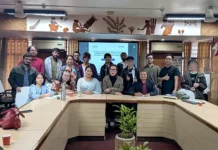Guwahati, 16 Feb: The Assam government on Friday launched Mission Basundhara 3.0′, which will ease rules for providing land rights to indigenous communities, give land ownership to organisations and provide settlement of land acquired from religious institutions, among others.
Chief Minister Himanta Biswa Sarma, launching the third phase at a programme here which also marked the conclusion of Mission Basundhara 2.0′, said the initiatives under it are to ensure reforms in the revenue department and make its services available to the public easily.
He said while the first phase of the Mission was limited to introducing online services for a few works related to the revenue department, the second phase included more substantial services’ like providing land ownership.
Mission Basundhara 3.0 seeks to take it forward and help eligible people and organisations enjoy land ownership rights, he added.
Under Basundhara 1.0, about 8 lakh applications were received and most of them were settled, while nearly 13 lakh applications were received in the second phase, nearly 2.3 lakh of which were approved.
The chief minister said the number of approvals is lower in the second phase as meticulous scrutiny of all claims was done and it is being ensured that no ineligible person got land rights.
Sharing key components of the third phase, Sarma said the need for submitting inheritance certificates for up to three previous generations will be relaxed for tea tribes, Scheduled Caste, Scheduled Tribes and Gorkha communities.
“This will ensure that about 1.5-2 lakh applications rejected under Basundhara 2.0 will get approved upon review. If there are more such eligible communities who need some leniency for availing their land rights, it should be brought to our notice and we will look into it,” he said.
Organisations which have been functioning from government land for years will also be provided ownership rights if found to meet all requirements, he said.
Settlement of bhoodan/ gramdan’ land in favour of indigenous, landless people who have it under occupation already will be done, with the remaining land to be taken over by the government, the CM said.
He said the government is trying to rationalize rates for premium payment in urban and peripheral areas so that the people can go for periodical payments rather than annual payments.
For people living in tea grant land’, the government will make a one-time exception and give them pattas after payment of a premium under Basundhara 3.0.
“If after this, anyone tries to sell tea grant land, they will face criminal charges and the land will also be confiscated,” Sarma said.
A similar arrangement will be worked out for devalaya’ (temple) and satra’ (Vaishnavite monastery) land which are not under active possession of these institutions.
“The district commissioners will carry out a survey and if indigenous people are settled on this land which is not in active possession of devalaya or satra, the people will get the land ownership. If required, compensation will be paid to devalaya or satra,” the CM said.
He said another important component is the conversion of non-cadastral villages to cadastral land, which will ensure land ownership rights to a large chunk of the population for the first time.
“Survey for this purpose has been already conducted in about 300 villages and it will be done for remaining areas soon,” he added.
Among other measures under Basundhara 3.0 are partition of family land with consensus of all members in an amiable manner and converting land records to maps, he said.
A digital land record system is being started from a block in Darrang district, which will soon be expanded to the entire state, the CM said, urging people to go for e-registration of land under available options.
Mission Basundhara was launched on October 2, 2021, while the second phase was rolled out in November 2022. (PTI)

